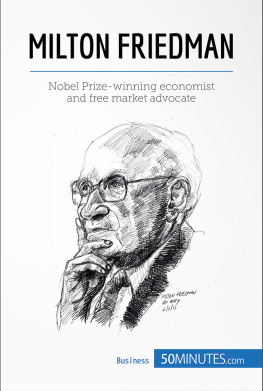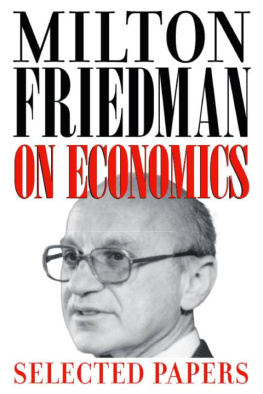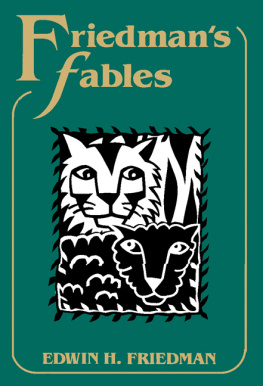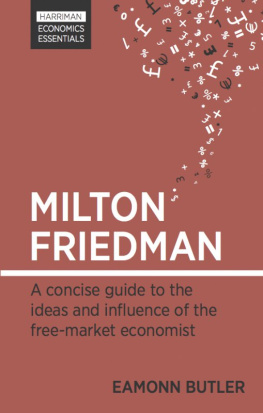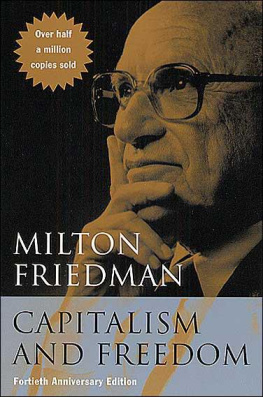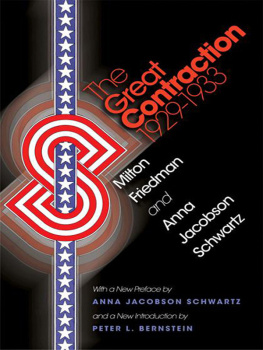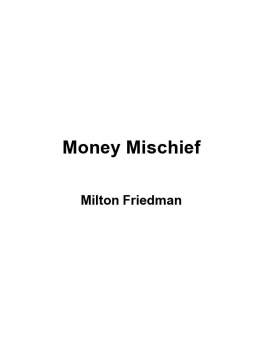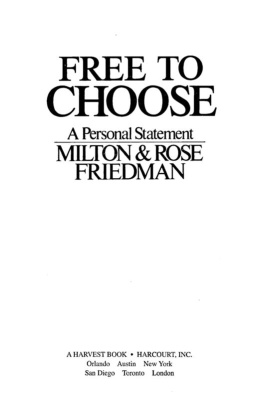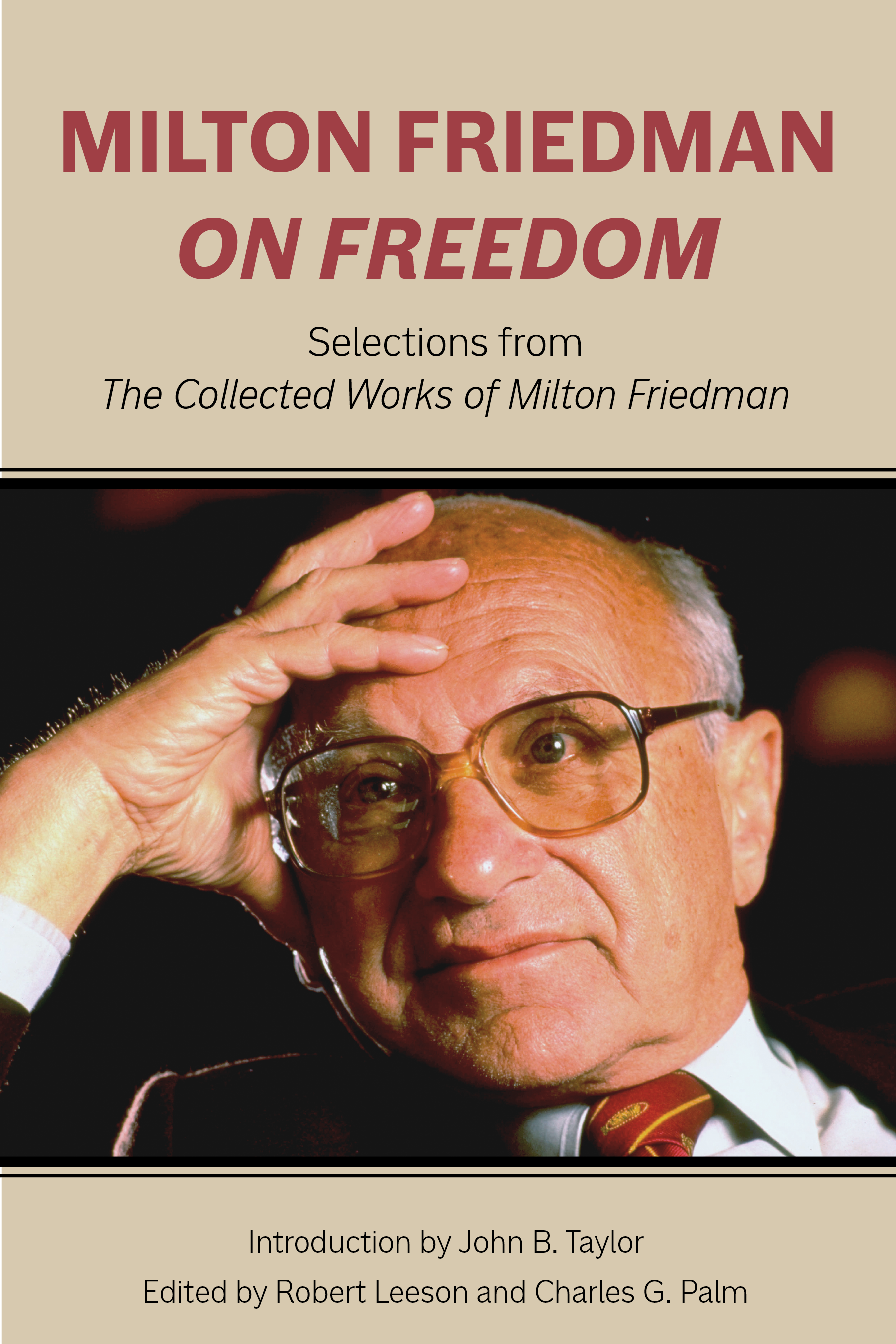Praise for
Milton Friedman on Freedom
Milton Friedman lives on because his ideas are forever and his expository skills are unsurpassed, as shown in this book of special importance in todays world.
George P. Shultz, Thomas W. and Susan B. Ford Distinguished Fellow, Hoover Institution, Stanford University, former US Secretary of State, Labor, and Treasury, and director, Office of Management and Budget
We live in an age when political, economic, religious and speech freedoms are both under attack and taken for granted. That makes these penetrating insights and trenchant analyses by their great champion, Milton Friedman, essential reading for all, both those who value freedoms great blessings and those who dont but should.
Michael J. Boskin, Tully M. Friedman Professor of Economics at Stanford University and former chairman of the Presidents Council of Economic Advisers
At a moment when free societies and their defenders are under growing ideological assault, Milton Friedmans incisive essays powerfully remind us of what it means to be free and why it matters. This is a luminous, timely, and necessary book.
George H. Nash, historian, author of The Conservative Intellectual Movement in America Since 1945 and a three-volume biography of Herbert Hoover, and a senior fellow at the Russell Kirk Center for Cultural Renewal
Milton Friedman
on Freedom
Milton Friedman
on Freedom
S elections from
The Collected Works of Milton Friedman
Compiled and Edited by
Robert Leeson and Charles G. Palm
Foreword by
John B. Taylor
H O O V E R I N S T I T U T I O N P R E S S
STANFORD UNIVERSITY STANFORD, CALIFORNIA
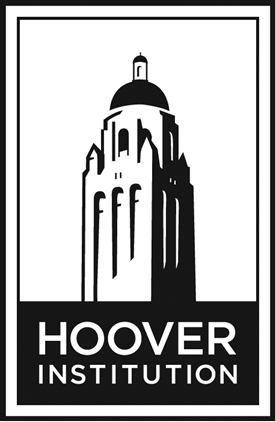
With its eminent scholars and world-renowned library and archives, the Hoover Institution seeks to improve the human condition by advancing ideas that promote economic opportunity and prosperity, while securing and safeguarding peace for America and all mankind. The views expressed in its publications are entirely those of the authors and do not necessarily reflect the views of the staff, officers, or Board of Overseers of the Hoover Institution.
www.hoover.org
Hoover Institution Press Publication No. 677
Hoover Institution at Leland Stanford Junior University, Stanford, California, 94305-6003
Copyright 2017 by the Board of Trustees of the
Leland Stanford Junior University
Preface and editorial selection/commentary/contributions:
Copyright 2017 by Robert Leeson and Charles G. Palm
All rights reserved. No part of this publication may be reproduced, stored in a retrieval system, or transmitted in any form or by any means, electronic, mechanical, photocopying, recording, or otherwise, without written permission of the publisher and copyright holders.
Efforts have been made to locate original sources, determine the current rights holders, and, if needed, obtain reproduction permissions. On verification of any such claims to rights in the articles reproduced in this book, any required corrections or clarifications will be made in subsequent printings/editions.
For original publication information and credits for individual essays reprinted herein, please refer to the Bibliographical Notes section on pages 227
Manufactured in the United States of America
Cataloging-in-Publication Data is available from the Library of Congress
ISBN 978-0-8179-2034-0 (cloth. : alk. paper)
ISBN 978-0-8179-2036-4 (ePub)
ISBN 978-0-8179-2037-1 (Mobipocket)
ISBN 978-0-8179-2038-8 (PDF)
CONTENTS
ONE
TWO
THREE
FOUR
FIVE
SIX
SEVEN
EIGHT
NINE
TEN
ELEVEN
TWELVE
THIRTEEN
FOURTEEN
FIFTEEN
PREFACE
When Milton Friedman died on November 16, 2006, at age ninety-four, Margaret Thatcher said of him, Milton Friedman revived the economics of liberty when it had all but been forgotten. He was an intellectual freedom fighter.
In these fifteen essays, authored during the course of nearly forty years, we have attempted to present Milton Friedmans views on freedom in a comprehensive and coherent way. Freedom imbued virtually all his writings. In most of them, however, he discussed it indirectly as it applied to specific policy questions. Only in occasional works, as he did in these fifteen pieces, did he write on freedom with a primary or theoretical focus, and never did he express in a single essay all his views on the subject. By bringing together the fifteen works in this volume, we have tried to capture all his views on freedom and, in doing so, to present a complete picture of his thinking about the value that formed the moral foundation of his intellectual life.
The writings in this volume have been selected from The Collected Works of Milton Friedman, which we have compiled and edited for publication by the Hoover Institution on its website. The Collected Works include all of Friedmans published scientific and public policy writings as well as significant unpublished manuscripts nearly 1,500 pieces totaling more than five million words. In addition to The Collected Works, the Hoover Institution site includes a substantial selection of Friedmans personal papers residing in the Hoover Institution Archives: correspondence, unpublished manuscripts, photographs, audio and television recordings, and other materials. By bringing these materials together in an organized way, the Hoover Institution has provided interested citizens, students, advanced scholars, and public policy makers access to more than seventy years of Friedmans works and ideas that will continue to be relevant far into the future.
We wish to acknowledge the Earhart Foundation, Roger Mertz, and Henrietta Fankhauser, who generously contributed financial support to our work and who share our interest in Milton Friedman. We also wish to thank Hoover Institution administrators and staff who assisted us in this effort, including Thomas Gilligan and John Raisian, the current and previous directors of the Hoover Institution, as well as Eric Wakin, Christopher Dauer, Gloria Valentine, Linda Bernard, Lisa Miller, Elizabeth Phillips, Carol Leadenham, Paige Minister, and Russell Rader.
Robert Leeson
Charles G. Palm
FOREWORD
I n this book Robert Leeson and Charles Palm have assembled an amazing collection of Milton Friedmans best works on freedom. Even more amazing is that the selection represents only 1 percent of the 1,500 works by Friedman that Leeson and Palm have put online in a user-friendly format and an even smaller percentage if you include their archive of Friedmans audio and television recordings, correspondence, and other writings.
This book and the larger online collection are sorely needed and very welcome. Milton Friedman deserves to be read in the original by generation after generation. I have found that people now tend to channel Friedman to support their own views, which sometimes are contrary to his actual views. With so much now readily available, everyone will find it easier to remember and learn from what he actually wrote and said. I think readers will find the book refreshing whether or not they are already familiar with Friedmans work.
It is a special pleasure to have the beautiful freedom essays packed into one lean volume. Leeson and Palm have usefully arranged the essays chronologically, enabling the reader to trace real-world developments over time and to see how Friedman reacted to these developments and indeed influenced them. In each essay Friedman focuses on a particular aspect or idea of freedom; throughout the volume he illustrates the abstract ideas with real-world examples and stories, from Alexander Hamiltons call for trade protection in 1791 to Friedmans own experiences in bringing an end to the military draft or promoting school vouchers nearly two centuries later.


